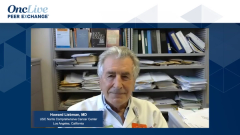
How Does Treatment Duration Impact Outcomes in ITP?
Experts consider how treatment duration can impact patient outcomes in immune thrombocytopenia and discuss discontinuation of TPO-Ras.
Episodes in this series

Transcript:
Morey Blinder, MD:Let's move on and talk about some of the longer-term issues. How does treatment duration affect platelet and patient outcomes? Are there any benefits for long-term therapy based on the mechanism of action, say? Is there one approach that might be more favored long-term, thinking really, really long term? Cindy, you potentially have the longest-term patients, right, because they're young people. So, we've touched on this in several ways, but thinking that your patients are going to live many, many more decades, does that change your approach at all?
Cindy Neunert, MD: Obviously when we talk about this, the benefits and the risks have to be taken into account. Like I said, I think that is why splenectomy is really not done frequently in pediatric patients because you're exposing them to that lifelong risk. As you said, that's a very long duration of time that they're then going to live in that condition and state. We're getting very comfortable having pediatric patients on thrombopoietin [TPO] receptor agonists for some time now. We don't have the years of data that you all do from the adult clinical trials, but certainly, we in our own clinical experience have had children that have now been on them for at least a year, up to 2 years. I think we're working to sort of see what we need to do to report our clinical experience, realizing that the clinical trial work I think is done from the industry standpoint. Though, I don't think we're seeing any increased signals in terms of staying on long-term. We do think a little bit differently because we don't deal with chronic diseases as much as adults. I think in the adult world there's still that need of what can we do upfront to really try to get longer remission status or to get better results in terms of prevention of persistent or chronic disease.
With pediatrics, I believe we think more along the lines of what is the best option that is going to have the lowest side effect profile to achieve the goals that the family is looking for. That is what we're looking for as the physician, whether that's to prevent subsequent bleeding, whether that's to reengage in activities, whatever that might be. The quality of life, fatigue, or what agent is really going to balance that the best? I will say the one thing that we didn't talk about with rituximab is when we talked about this in terms of guidelines, it was really hard because you're kind of comparing apples and oranges when you start to talk about a drug that you give four doses and then you're off therapy, versus these other agents that do require some degree of ongoing therapy we think to have effect. I think we're still learning about TPO and remission. But rituximab for some patients, if it's one year, and this came up when we had patients on the panel as well. Well, if I can have one year even if I relapse in a year, that's one year of not being on medicine and not having to think about medicine. That would be a benefit to them. So, our patients may also have different priorities than what we might think is best long-term as a physician as well.
Morey Blinder, MD:I think we've touched on this, but there was a recent abstract that looked at stopping mostly romiplostim in this setting with long-term durability of the platelet count. I think that was a Boston study. Howard or Danny, do you want to comment on long-term duration, long-term stopping of therapy and duration of response? I think we have touched on it a little bit, but maybe with respect to some of the recent studies that are out there.
Howard Liebman, MD: Well, if you go back to the first study, in the persistent phase they put them on romiplostim and they were determined to stop at 52 weeks if they maintained a platelet count above 50,000 for much of that time. When they stopped it, they found that about 30% of patients actually went on for another 6 months, with platelet counts above 50,000 and 20% had normal platelet counts. I haven't looked yet at the 2-year data, but there are still patients in remission. Our experience has been that we had patients who had long-term remissions, and the data now really shows that there are patients that will sustain remissions. Remember when we're doing this, this is not the patients usually that have had the disease 5 years. These are the patients early on, and we mentioned part of the reason that they had this acute and then the persistent phase is that we already knew back before we had these drugs that there were groups in that persistent phase that would inevitably get a remission. So, whether we're just keeping them safe until they get their spontaneous remission is hard to say. That 20% lines up pretty well with what you'd expect for somebody else. But again, there are patients. Dave Kuter [, MD, PhD,] has some, the [Massachusetts General Hospital] has some, and we have some that have gone in on TPO receptor agonists and had been in remission. I think I have 5 patients who were treated that we were trying to put the data together with romiplostim and eltrombopag for short periods of time, and then they reduced their doses and had been in remission greater than 2 years off of everything. These were patients who had the disease for 4 years. One patient had the disease 4 years before. So, this is not a surprise I think, because how do we treat hemophilia? It's a factor VIII inhibitor. We give them a lot of factors VIII and they go into remission. I think it's a new tolerance. I think it's readjusting the immune system.
Jim Bussel [,MD, Weill Medical College, Cornell University,] did a paper showing that patients who were on TPO receptor agonists had increases in their T-regulatory cells. It showed that you can reset the T-cell repertoire, because antibodies in ITP [immune thrombocytopenia] are antibodies that are T-cell derivative. They needed helper T cells. [A study] showed even for rituximab, the patients who had good responses in 2 papers in Blood reset their T-regulatory cells. So, they actually had reset their immune repertoire. I think that happens with TPO receptor agonists also. Though I don't know if we know how to predict who's going to have it. But I think it’s encouraging for the patient to tell them that if you're doing well on this drug, why not stay on it, because you might get a long-term remission. We might be able to take you off it. We have patients who we've been able to reduce their doses to once or twice a week. The funniest case [of one of my colleague], was a woman who has been on eltrombopag for five years. She only takes 25 mg once a week. She's not willing to stop the 25 mg once a week because she doesn't want to relapse, despite the efforts to convince her to stop. Totally normal platelet count. Again, that's a story that I think you brought about. You have to see what the patient wants. She's happy at 25 mg once a day and she has a normal platelet count. Have her come in every 6 months and see how she's doing so you refill her prescription.
Morey Blinder, MD:I think the immune system is a very mysterious thing, and then late relapses occur too.
Transcript edited for clarity.









































